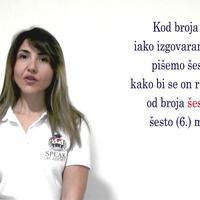Lesson 7.4 Serbian language - Numbers up to 1000
|||Zahlen|bis|
Lektion 7.4 Serbische Sprache – Zahlen bis 1000
Μάθημα 7.4 Σερβική γλώσσα - Αριθμοί έως 1000
Lesson 7.4 Serbian language - Numbers up to 1000
Lección 7.4 Idioma serbio - Números hasta 1000
Leçon 7.4 Langue serbe - Nombres jusqu'à 1000
Lekcja 7.4 Język serbski - Liczby do 1000
Урок 7.4 Сербский язык - Числа до 1000
Ders 7.4 Sırp dili - 1000'e kadar sayılar
Урок 7.4 Сербська мова - Числа до 1000
课 7.4 塞尔维亚语 - 1000 以内的数字
Brojevi do 1000
Zahlen|
Kada je reč o stotinama
||||Hunderte
||||hundreds
When it comes to hundreds
stotine nemaju nastavak za zbirne brojeve
Hunderte||Fortsetzung||summierende|Zahlen
hundreds|||||
hundreds do not have a suffix for collective numbers
Zbirna je samo poslednja cifra u nizu
Zahlensumme|||letzte|Zahl||Reihe
Sum||||digit||sequence
The collective is only the last digit in the series
trista šezdesetoro
dreihundert|sechzig
three hundred|sixty
three hundred sixty-three
trista šezdeset petoro
|sechzig|fünf
three hundred|sixty|five
three hundred sixty-five
Stotine se grade uz pomoć nastavka -sto ili -sta
Hundreds are formed using the suffixes -sto or -sta
Kod broja 600 iako izgovaramo šesto
||although|we say|sixth
For the number 600, although we pronounce it as six hundred
pišemo šeststo
|six hundred
we write it as six hundred
kako bi se on razlikovao od broja šesti šesto mesto
||||differed|from||||
so that it can be distinguished from the number sixth, sixth place
Redni brojevi
Ordinal numbers
stoti
hundredth
hundredth
dvestoti
two hundredth
two hundredth
tristoti
three hundredth
četristoti
four hundred
four hundredth
petstoti
five hundred
five hundredth
šeststoti
six hundredth
six hundredth
sedamstoti
seven hundred
osamstoti
eight hundredth
devetstoti
nine hundred
hiljaditi
thousandth
Redni brojevi dobijaju i svoje regularne nastavke za muški, ženski i srednji rod
|||||regular|endings|||||neuter gender|
Ordinal numbers also have their regular endings for masculine, feminine, and neuter gender.
Imenice menjaju oblik u skladu sa poslednjom cifrom u nizu.
|change|||in accordance||the last|digit||the series
Nouns change form according to the last digit in the series.
Isto važi pravilo kao i kada smo govorili o osnovnim brojevima prve desetice
This|applies|rule|||||||||first|
The same rule applies as when we talked about the basic numbers of the first decade.
Dakle, uz brojeve od dva do četiri imenice dobijaju oblike genitiva jednine
|||||to|||receive|||
Thus, with the numbers from two to four, nouns take the forms of the genitive singular
uz brojeve od pet pa nadalje, oblik genitiva množine
|||||and beyond|||
with the numbers from five onwards, the form is the genitive plural

